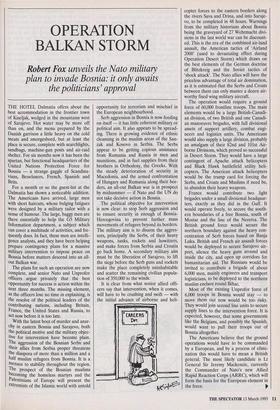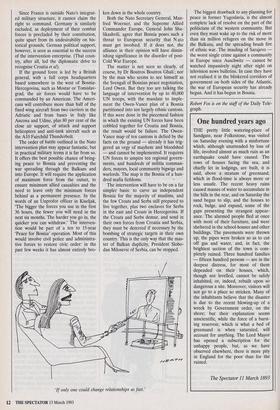OPERATION BALKAN STORM
Robert Fox unveils the Nato military
plan to invade Bosnia: it only awaits the politicians' approval
THE HOTEL Dalmatia offers about the best accommodation in the frontier town of Kiseljak, wedged in the mountains west of Sarajevo. Hot water may be more off than on, and the menu prepared by the Danish garrison a little heavy on the cold meats and smorgesbord, but at least the place is secure, complete with searchlights, sandbags, machine-gun posts and air-raid shelter. For six months now it has been the spartan, but functional headquarters of the United Nations Protection Force for Bosnia — a strange gaggle of Scandina- vians, Beneluxers, French, Spanish and Brits.
For a month or so the guest-list at the Dalmatia has shown a noticeable addition. The Americans have arrived, large men with short haircuts, whose bulging fatigues were designed by a military tailor with a sense of humour. The large, baggy men are there essentially to help the G5 Military Information department, a subject which can cover a multitude of activities, and fre- quently does. In fact, these men are intelli- gence analysts, and they have been helping prepare contingency plans for a massive military intervention to impose peace on Bosnia before matters descend into an all- out Balkan war.
The plans for such an operation are now complete, and senior Nato and Unprofor officers argue privately that the best Opportunity for success is action within the next three months. The missing element, as the officers lose no time in explaining, is the resolve of the political leaders of the contributing nations, including Britain, France, the United States and Russia, to act now before it is too late.
With the latest bout of murder and anar- chy in eastern Bosnia and Sarajevo, both the political motive and the military objec- tive for intervention have become plain. The aggression of the Bosnian Serbs and their allies from Serbia proper threatens the diaspora of more than a million and a half muslim refugees from Bosnia. It is a menace to stability throughout the region. The prospect of the Bosnian muslims becoming the homeless martyrs and the Palestinians of Europe will present the extremists of the Islamic world with untold opportunity for terrorism and mischief in the European neighbourhood.
Serb aggression in Bosnia is now feeding on itself — it has little coherent military or political aim. It also appears to be spread- ing. There is growing evidence of ethnic cleansing in the muslim areas of the San- zak and Kosovo in Serbia. The Serbs appear to be getting copious assistance from Rumania and Russia in men and munitions, and in fuel supplies from their brothers in Orthodoxy, the Greeks. With the steady deterioration of security in Macedonia, and the armed confrontation of Hungary and Rumania along their bor- ders, an all-out Balkan war is in prospect by midsummer — if Nato and the UN do not take decisive action in Bosnia.
The political objective for intervention is now clear: to stop Serb aggression and to ensure security in enough of Bosnia- Hercegovina to prevent further mass movements of refugees beyond its borders. The military aim is to disarm the aggres- sors, principally the Serbs, of their heavy weapons, tanks, rockets and howitzers, and make forces from Serbia and Croatia go back home. A secondary military aim must be the liberation of Sarajevo, to lift the siege before the Serb guns and rockets make the place completely uninhabitable and scatter the remaining civilian popula- tion of 350,000 to the winds.
It is clear from what senior allied offi- cers say that intervention, when it comes, will have to be crushing and swift — with the initial advance of airborne and heli- copter forces to the eastern borders along the rivers Sava and Drina, and into Saraje- vo, to be completed in 48 hours. Warnings from the military historians about Bosnia being the graveyard of 27 Wehrmacht divi- sions in the last world war can be discount- ed. This is the era of the combined air-land assault, the American tactics of 'Airland 2000' (used to devastating effect during Operation Desert Storm) which draws on the best elements of the German doctrine of Blitzkreig and the Soviet tactics of `shock attack'. The Nato allies will have the priceless advantage of total air domination, as it is estimated that the Serbs and Croats between them can only muster a dozen air- worthy fixed wing military aircraft.
The operation would require a ground force of 60,000 frontline troops. The main elements would be a large British-Canadi- an division, of two British and one Canadi- an manoeuvre brigades, with full divisional assets of support artillery, combat engi- neers and logistics units. The Americans would also supply a large division, probably an amalgam of their 82nd and 101st Air- borne Divisions, which proved so successful in Desert Storm. They would have a large contingent of Apache attack helicopters and Black Hawk battlefield utility heli- copters. The American attack helicopters would be the trump card for forcing the Serbs, and Croats and Muslims if need be, to abandon their heavy weapons.
France would contribute two light brigades under a small divisional headquar- ters, exactly as they did in the Gulf. It would operate freely, to secure the south- ern boundaries of a free Bosnia, south of Mostar and the line of the Neretva. The British ground force would secure the northern boundary against the heavy con- centration of Serb forces based on Banja Luka. British and French air assault forces would be deployed to secure Sarajevo air- port, silence the heavy guns around and inside the city, and open up corridors for humanitarian aid. The Russians would be invited to contribute a brigade of about 6,000 men, mainly engineers and transport logisticians, to be deployed to the northern muslim enclave round Bihac.
Most of the existing Unprofor force of 6,000 troops in Bosnia would stay — to move them out now would be too risky. They would join second line units to secure supply lines to the intervention force. It is expected, however, that some governments like the Belgians, and possibly the Spanish, would want to pull their troops out of Bosnia altogether.
The Americans believe that the ground operations would have to be commanded by a European, and by a process of elimi- nation this would have to mean a British general. The most likely candidate is Lt General Sir Jeremy Mackenzie, currently the Commander of Nato's new Allied Rapid Reaction Corps (ARRC), which will form the basis for the European element in the force. Since France is outside Nato's integrat- ed military structure, it cannot claim the right to command. Germany is similarly excluded, as deployment of their combat forces is precluded by their constitution, quite apart from its undesirability on his- torical grounds. German political support, however, is seen as essential to the success of the intervention enterprise. (That coun- try, after all, led the diplomatic drive to recognise Croatia et al).
If the ground force is led by a British general, with a full corps headquarters based somewhere in the west of Bosnia- Hercegovina, such as Mostar or Tomislav- grad, the air forces would have to be commanded by an American. The Ameri- cans will contribute more than half of the fixed wing aircraft from two carriers in the Adriatic and from bases in Italy like Ancona and Udine, plus 80 per cent of the close air support, of attack and support helicopters and anti-tank aircraft such as the A10 Fairchild Thunderbolt.
The order of battle outlined in the Nato intervention plan may appear fantastic, but in practical military terms it is far from so. It offers the best possible chance of bring- ing peace to Bosnia and preventing the war spreading through the Balkans and into Europe. It will require the application of maximum force from the outset, to ensure minimum allied casualties and the need to leave only the minimum forces behind as a permanent presence. In the words of an Unprofor officer in Kiseljak, `The bigger the forces you use in the first 36 hours, the fewer you will need in the next six months. The harder you go in, the quicker you can withdraw.' The interven- tion would be part of a ten to 15-year `Peace for Bosnia' operation. Most of this would involve civil police and administra- tive forces to restore civic order: in the past few weeks it has almost entirely bro- ken down in the whole country.
Both the Nato Secretary General, Man- fred Woerner, and the Supreme Allied Commander Europe, General John Sha- likashvili, agree that Bosnia poses such a threat to European security that N ato must get involved. If it• does not, the alliance in their opinion will have dimin- ishing significance in the disorder of post- Cold War Europe.
The matter is not seen so clearly, of course, by Dr Boutros Boutros Ghali ; nor by the man who seems to see himself as the Svengali of Bosnian peace negotiation, Lord Owen. But they too are talking the language of intervention by up to 40,000 UN troops, with the mandate to imple- ment the Owen-Vance plan of a Bosnia partitioned into ten largely ethnic cantons. If this were done in the piecemeal fashion in which the existing UN forces have been cobbled together for Croatia and Bosnia, the result would be failure. The Owen- Vance map of ten cantons is defied by the facts on the ground — already it has trig- gered an orgy of mayhem and bloodshed — and cannot be implemented. It requires UN forces to umpire ten regional govern- ments, and hundreds of militia comman- ders, mayors, local community bigwigs and warlords. The map is the Bosnia of a hun- dred mafia fiefdoms.
The intervention will have to be on a far simpler basis: to carve an independent Bosnia for the majority of muslims, and the few Croats and Serbs still prepared to live together, plus two enclaves for Serbs in the east and Croats in Hercegovina. If the Croats and Serbs demur, and send in their own forces from Croatia and Serbia, they must be deterred if necessary by the bombing of strategic targets in their own country. This is the only way that the mas- ter of Balkan duplicity, President Slobo- dan Milosevic of Serbia, can be stopped.
`If only one could change relationships as fast.' The biggest drawback to any planning for peace in former Yugoslavia, is the almost complete lack of resolve on the part of the politicians of the western community. But even they must wake up to the risk of more than six million refugees on the move in the Balkans, and the spreading brush fire of ethnic war. The mauling of Sarajevo the worst single crime against a community in Europe since Auschwitz — cannot be watched impassively night after night on television news bulletins. In case they have not realised it in the blinkered corridors of government on both sides of the Atlantic, the war of European security has already begun. And it has begun in Bosnia.



























































 Previous page
Previous page